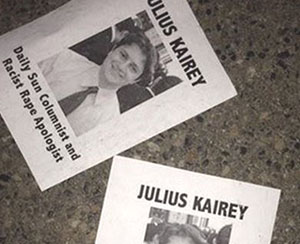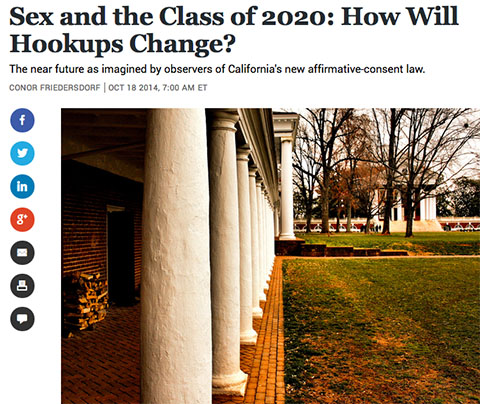
A national magazine is asking young people how they think sex might change under a new state law regulating college campuses. Thankfully, it’s not Cosmopolitan (or Maxim, yeesh).
The Atlantic‘s Conor Friedersdorf wrote a column that helpfully summarizes the various viewpoints – “wildly divergent forecasts,” in his words – on how California’s affirmative-consent law will shake out in the dorm room.
Rather than ask campus activists or hip culture writers, Friedersdorf goes (wo)man-on-the-street:
I hope current college students (or recent grads) who’ve made it through the musings of out-of-touch oldsters like me will reflect on their observations and experiences, and then send email articulating how they think affirmative-consent laws will play out (or have played out) on campus. What are commentators who haven’t themselves been college students for years or decades missing, or misunderstanding, about sexual culture on campus today or how it will change?
Friedersdorf published his first email on Monday from a recent male graduate, and it’s worth reading in full. A snippet:
I was raised by a left-leaning, feminist family who (at least I thought at the time) were relatively open about sex. But while I arrived at college with a healthy respect for women, I was totally unprepared for the complex realities of female sexuality. …
On our second night together, one of my first partners threw up her hands in disgust. “How am I supposed to get turned on when you keep asking for permission for everything like a little boy?” She said. “Just take me and fuck me already.”
She didn’t stay with me for long.
This would be a recurring theme. More than once I saw disappointment in the eyes of women when I didn’t fulfill the leadership role they wanted me to perform in the bedroom.
Friedersdorf said this was a perspective shared by “several different respondents” to his invitation:
Agree or disagree with him, this much is clear: If his attitude persists among a significant number of college students, it will be a huge obstacle to spreading affirmative-consent culture.
Student attitudes should not be taken lightly, and students shouldn’t be discouraged from sharing their own experiences and interpretations on such a weighty subject.
Unfortunately, discouragement seems like exactly what will happen on many college campuses.
When ‘a real dialogue’ becomes ‘hateful’
When a Cornell newspaper columnist wrote skeptically (but respectfully) about “rape culture” and affirmative consent in two columns, his detractors’ response was to paper the campus with flyers denouncing him as a “rape apologist.”
That columnist’s call for a “real dialogue about the importance of consent and what it means to consent to sex,” as The College Fix reported, was met in cyberspace by the equivalent of yelling “she’s a witch!”
Student Anna-Lisa Maria wrote in response to his “Rape Culture” article, garnering 65 Likes, “I can’t believe the Sun printed this garbage. … I would say it’s ignorant but that implies innocence. This is hateful. The Cornell Daily Sun just gave 729 words to a rape denier.”
The Atlantic‘s Friedersdorf doesn’t sound any more sanguine that a respectful campus debate is coming:
I’d be curious to see a frank debate between this young man and critics of his position. (Would anyone be persuaded to refine their position or learn how to better persuade their critics?) But the sensitivity of the subject, the understandable aversion most people have to speaking on-the-record about their past sexual encounters, and the way both politically correct stigma and misogynistic threats are used to police discourse on this subject make it less likely that college men who feels this way will have open, rigorous on-campus exchanges with those whose perspective is different.
Instead, we’re likely to see college students with a more nuanced view – men and women, perhaps even folks who opt out of the binary view of gender – mouthing the agreed-upon platitudes in public and in their EverFi training modules, like The Lord’s Prayer as conceived by Gloria Steinem, and making fun of the system at parties, on Yik Yak, anywhere they can’t get in trouble.
The prediction summarized by Friedersdorf that I find most convincing actually concerns the likelihood of driving certain viewpoints underground – that of New York Times columnist Ross Douthat, whose Ivy League memoir Privilege remains a must-read:
[The application of affirmative consent] will have a randomness, an arbitrariness, and an occasional absurdity that will encourage a mix of resentment and resistance. As such, it will lock in an aspect of contemporary sexual culture that social conservatives probably don’t talk enough about: The kind of toxic misogyny that feminists rightly call out and critique, but that also exists in a kind of twisted symbiosis with certain aspects of feminist ideology …
I hope The Atlantic continues publishing varying viewpoints on affirmative consent from students themselves, to lend legitimacy to the value of debate itself, which is not in abundant supply on the average campus.
A modest proposal, with nipple clamps
Such a respectful airing of differences should encourage campus newspapers everywhere to not only run letters to the editor on the subject, but to actually host respectful forums on what consent means to today’s college students.
Newspapers don’t have to invite George Will, Dan Savage or any elite arbiter of opinion. They don’t have to get a constitutional lawyer from the Foundation for Individual Rights in Education to talk about the importance of due process in American history. Students are already resigned to being passive recipients throughout their college career.
A fair-minded faculty member could be enlisted to moderate a discussion among a group of students – maybe even multiple groups over a semester – who have varying perspectives and backgrounds, perhaps chosen through a newspaper-run Twitter contest.
The ground rules would be simple: Everyone listens. Everyone shakes hands. No one pounces. No interruptions or audience signs.
Student governments could appropriate funds; opposing campus political groups could co-sponsor. The local media will most likely show up if it’s pitched to them (on a slow news day). Try reaching out to The Daily Show, which has recently shown interest in student media.
Hell, ask the local smut shop to send along free samples. That will get students to show up (and probably Dave Attell too).
Working title: “What The F*ck Is Consent?”
Greg Piper is an assistant editor at The College Fix. (@GregPiper)
Like The College Fix on Facebook / Follow us on Twitter
IMAGES: Cornell Review, The Atlantic screenshot








Please join the conversation about our stories on Facebook, Twitter, Instagram, Reddit, MeWe, Rumble, Gab, Minds and Gettr.